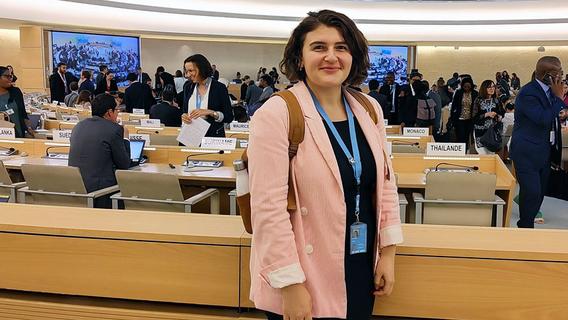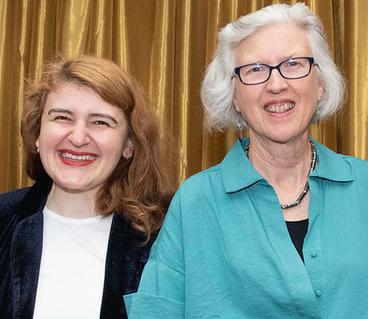
Natia Kantaria was a veteran human rights advocate long before she completed her Master of Human Rights (MHR) earlier this month at the University of Minnesota.
But Kantaria’s experience in the U of M’s human rights degree program, jointly offered by the College of Liberal Arts and the Humphrey School of Public Affairs, has given her opportunities to sharpen her focus on the intersection of human rights and environmental justice.
In fact, Kantaria is the recipient of the inaugural Sharon Grimes Human Rights Fellowship, a $1,000 grant awarded to an MHR student with a commitment to human rights and the environment.
"There is no environmental justice without human rights,” she says.
Kantaria also received the 2024 Barbara Frey Fellowship, which will pay for her to work with the International Service for Human Rights in New York City for one year, beginning in September. The Frey Fellowship, named for retired Human Rights Program Director Barbara Frey, is designed to help new MHR graduates gain professional experience that will help them advance their careers.
Kantaria, who is from the eastern European country of Georgia, has worked in human rights advocacy for the past decade on projects funded by the Council of Europe, European Union, USAID, and other organizations. She was awarded a Fulbright Scholarship to study human rights at the University of Minnesota.
The link between climate and human rights
Last fall, Kantaria traveled to Dubai for the 28th UN Conference of the Parties (COP28), devoted to addressing global climate change, as a member of the University of Minnesota observer delegation. Her primary objective was to assess how and if member countries advocated for a human rights approach to climate issues —specifically concerning climate financing and the establishment of the loss and damage fund, which is designed to assist countries that are disproportionately affected by climate change.
The establishment of the fund emerged as one of the most contentious topics of the negotiations.

Working with the UN Independent Expert on Foreign Debt, International Financial Obligations, and Human Rights, Kantaria also delved into the tools of fighting climate change such as debt cancellation and taxes, among others.
The Sharon Grimes Fellowship supports the idea that the environment is inextricably linked to human rights, including the right to health, water, life, sanitation, food, culture, and basic enjoyment of all other human rights.
“Climate change disproportionately impacts the most vulnerable and underrepresented communities, including women, children, Indigenous peoples, persons with disabilities, ethnic and religious minorities, LGBTQIA+ individuals, and others facing various social and economic challenges,” Kantaria points out.
According to the UN’s Office of the High Commissioner on Human Rights (OHCHR), those living in island states and developing nations are especially at risk of water scarcity, desertification, land degradation, and drought. This, Kantaria argues, is where human rights principles of equality and non-discrimination, participation, accountability, and legality come into play.
“Environmental activism cannot be understood separately from human rights,” she says. Global inequalities that exist because of former colonial developed nations—the primary historical culprits of pollution—must also be considered.
While a human rights approach to environmental activism seems like the clear path ahead for some, challenges persist. According to Kantaria, one of these challenges is that some countries are avoiding human rights language and failing to reference various binding international legal instruments in discussions.
“In my personal opinion, this is an attempt to somehow avoid the commitments that would come with the official acknowledgement of the direct linkages between human rights violations and international human rights law,” she says.
Keeping up the fight
Kantaria appreciates the support of her work from the MHR program and the Grimes Fellowship, which encourages others to become more involved in human rights advocacy.
“Receiving the fellowship signifies my official commitment to actively continue engaging with the topic, and contributing by addressing existing gaps and challenges wherever possible,” she says. “It’s both a responsibility and a sign of trust in me to be a genuine representative of the title of fellow.”
Kantaria attributes her strong passion for advocacy work to her family, and her grandmother in particular. Her family members come from Abkhazia, an occupied region of Georgia. They hold status as internally displaced persons, “which we did not intend to have,” she says, recalling the day they were evicted from their homes along with other Georgian families.
Later, after enduring years of fear, isolation, and inhumane treatment from Russian peacekeeper soldiers, her grandmother crossed the border and stayed in another part of the country with family. In all those years, Kantaria says her grandmother never once unpacked her bag from Abkhazia, believing that she had to be ready to leave at a moment’s notice if there was ever a chance to return home.
The hope of return is what “kept her strong and powerful,” Kantaria says. “Despite the hardships she went through, she never stopped looking forward to better days. Having this as an example, I try to also contribute to the fight for those whose rights were undermined. Therefore, I myself do not have the right to be hopeless.”
A fairer and cleaner future
Kantaria still continues to advance change, believing that human rights can pave the way for environmental justice.
“Having human rights at the core of discussions and referencing international human rights instruments will make the battle against climate change more effective,” she says.
Kantaria says the international community must come together to address climate change. Cooperation is key—and wealthier countries hold the greatest historical responsibility. If these countries are serious about their human rights commitments, she says, they must work with the rest of the global community to ensure the right to remedy for countries who have suffered most severely and whose people are unable to enjoy their basic human rights.
Advocates like Kantaria play a crucial role in this endeavor, working to ensure a planet that not only sustains human life, but one that also fulfills human rights.
---
Adapted from the original story published by the Human Rights Program.

